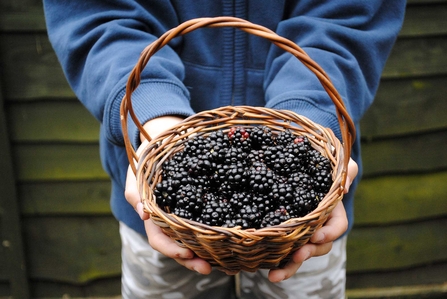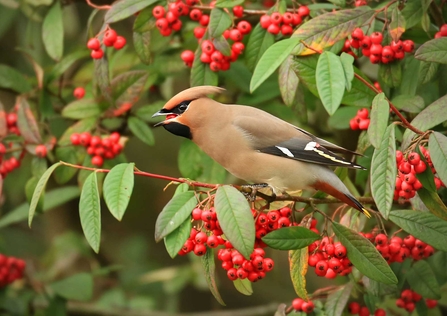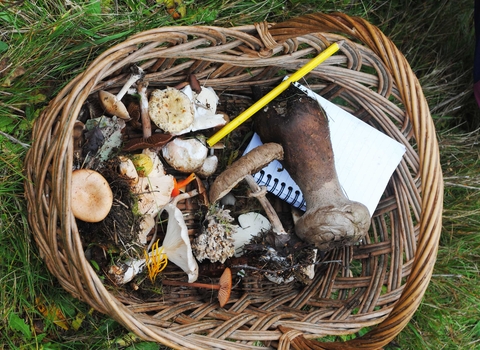Wild food
There is increasing interest in and media coverage of gathering, preparing and consuming wild food. Whilst this can undoubtedly encourage an interest in the natural environment, uncontrolled foraging can impact negatively on ecosystems. This is particularly the case with the collection of wild fungi.
Why fungi picking isn't allowed on our sites
The problem
There are at least 12,000 species of fungi native to the UK. They can be found in all habitats and are an essential component of the biodiversity of our nature reserves and countryside sites.
Fungi are a vital part of functioning ecosystems playing a key role in decomposition, recycling of nutrients and provision of food and habitat resource to many other organisms. Whilst some fungi species may be found in abundance others are rare, threatened or in decline.
Fruiting bodies of some species of fungi are valued as food and actively collected for the pot by individuals for their own consumption or by groups collecting commercially for the restaurant trade.
Some of our nature reserves have been regularly subjected to indiscriminate and intensive collecting for many years, damaging the sensitive ecosystem of these sites.
Our policy
Collection of any fungi from sites under management by Surrey Wildlife Trust is not permitted unless part of an authorised scientific or educational survey or event or as otherwise authorised by law.
It is also illegal to collect fungi from our sites for commercial purposes, and to intentionally damage or disturb a site that has SSSI (Site of Special Scientific Interest) designation.
Our policy is founded on the following principal reasons:
-
Legal – see above
-
The critical ecological role of fungi and their relationship to a host of other species, some of which are dependent on fungi.
- The effect that collecting of fruiting bodies may have on the reproductive capability of fungi. Some of these species are likely to be rare or threatened.
- Visitors to our sites are entitled to enjoy the sight of fungal fruiting bodies in-situ.
- Groups of collectors can cause damage to sensitive habitats and other species through trampling in concentrated areas.
Enforcement
It is acknowledged that practical enforcement of a ban on fungi collecting can be difficult as the activity often takes place at first light or in remote parts of a site. However, by making our position clear to all site visitors it is hoped that the impact of this activity will reduce over time.
Signs in multiple languages (eg English, Italian, Polish, Romanian) are erected in the Autumn at those sites deemed most at risk from intensive fungi collecting. These signs state that no species can be taken from site without possession of a licence from Surrey Wildlife Trust.
Collectors who are encountered by site managers will be politely asked to desist and given an explanation as to why we do not allow the activity. Collected specimens will be confiscated.
Persistent offenders will be reported to the police and a crime reference number obtained. On sites where the problem is acute, site managers may proactively raise the issue directly with local Wildlife crimes officer or neighbourhood police to ask for support in monitoring picking activity.

© Amy Lewis
Foraging for other types of food
Small scale, non commercial gathering of some fruits, nuts and leaves is a traditional use of the countryside. However the complete stripping of fruits from a shrub or tree will affect food availability to other species.
For this reason, we ask that you pick berries, nuts and fruits responsibly on our sites and ensure that you leave enough food for wildlife.
Foraging code of conduct
Be sure of what you are picking
Some wild plants may be poisonous or even deadly if consumed. If you are not certain of the identity of a plant, fruit or berry, leave it alone.
Leave enough for wildlife
Only collect from areas where wild food is plentiful. It is important to forage sustainably to leave food for other species such as birds, insects and mammals, as well as to allow plants to reproduce.
Take only what you plan to eat. Remember, other people may come foraging and areas of fruits and berries can quickly be stripped.
Avoid damaging other habitats and species
Please avoid trampling, uprooting or damaging other plants, trees and shrubs when foraging. Many of our sites contain rare species and may be protected by law.
The large scale and commercial collecting of fruits, nuts and leaves from plants not permitted on Surrey Wildlife Trust sites and any collection on SSSIs requires prior agreed permission from the Trust.
Surrey Wildlife Trust wild food gathering policy

© Jon Hawkins

